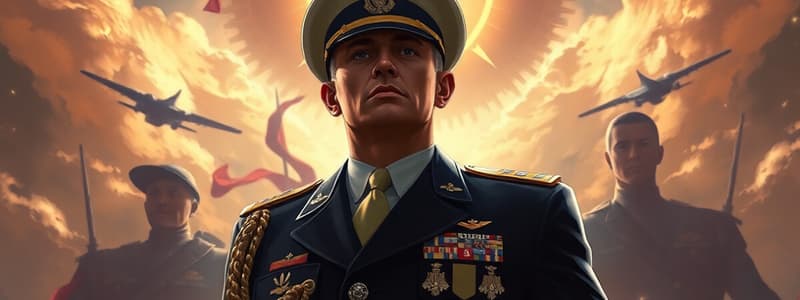Podcast
Questions and Answers
What role does the Senate play in the negotiation of treaties?
What role does the Senate play in the negotiation of treaties?
Which of the following best describes the limits on the President's power as Commander-in-Chief?
Which of the following best describes the limits on the President's power as Commander-in-Chief?
How have Presidents historically used military power?
How have Presidents historically used military power?
What factor significantly influences a President's decision to use military power?
What factor significantly influences a President's decision to use military power?
Signup and view all the answers
Which branch of government constrains the President's military authority?
Which branch of government constrains the President's military authority?
Signup and view all the answers
What constitutional article grants the President the role of Commander-in-Chief?
What constitutional article grants the President the role of Commander-in-Chief?
Signup and view all the answers
Which of the following is a significant power held by Congress as a check on the President's military authority?
Which of the following is a significant power held by Congress as a check on the President's military authority?
Signup and view all the answers
How long can the President deploy troops without explicit congressional approval according to the War Powers Resolution?
How long can the President deploy troops without explicit congressional approval according to the War Powers Resolution?
Signup and view all the answers
What aspect of military authority does the President NOT have absolute control over?
What aspect of military authority does the President NOT have absolute control over?
Signup and view all the answers
Which body is primarily responsible for advising the President on national security and military strategy?
Which body is primarily responsible for advising the President on national security and military strategy?
Signup and view all the answers
What is the purpose of the War Powers Resolution?
What is the purpose of the War Powers Resolution?
Signup and view all the answers
Which of the following statements is true regarding executive orders issued by the President?
Which of the following statements is true regarding executive orders issued by the President?
Signup and view all the answers
What aspect of military authority does the War Powers Resolution specifically address?
What aspect of military authority does the War Powers Resolution specifically address?
Signup and view all the answers
Study Notes
Constitutional Basis
- The Constitution outlines the President's role as Commander-in-Chief of the armed forces.
- This power is explicitly granted by Article II, Section 2 of the Constitution.
- This empowers the President to lead and command the nation's military forces.
Defining Commander-in-Chief
- The Commander-in-Chief power encompasses significant authority over military strategy and operations.
- This includes the deployment of troops, the formulation of war plans, and the direction of military actions.
- This authority is not absolute and is subject to other constitutional checks and balances.
Legislative Check on President's Power
- Congress holds the power to declare war, a significant check on presidential authority.
- Congress appropriates funds for military operations, influencing the President's ability to conduct military actions.
- Congress also has the power to raise and support armies, and to provide and maintain a navy.
- Congress can override a presidential veto on military spending or other related legislation.
- Legislation like the War Powers Resolution aims to define limits on presidential deployment of troops without congressional approval or declaration of war.
War Powers Resolution
- The War Powers Resolution of 1973 is a significant piece of legislation designed to define the limits of presidential military deployment without congressional authorization.
- The act establishes a 60-day period, with a further 30-day extension, for troop deployment without explicit congressional approval.
- It seeks to balance the President's role and Congressional authority during war and other military actions.
- The resolution's implementation and effectiveness have been debated and contested since its enactment.
Executive Orders and Directives
- The President issues executive orders to direct the military through administrative means.
- Executive orders may establish policies, make operational decisions, and direct specific actions within the military framework.
- These directives aren't as impactful as formal declarations of war and don't usually declare war, but they can shape the conduct and deployment of military forces.
National Security Council (NSC)
- The NSC is a key advisory body to the President on national security matters including military strategy.
- The NSC often plays a critical role in shaping the President's understanding of military options and policies.
Treaties and Agreements
- The President, with the Senate's advice and consent, negotiates treaties, influencing nations' armed forces response.
- Treaties related to defense agreements can shape relationships and international military activities.
Limitations on Power
- The President's authority as Commander-in-Chief is not unlimited.
- It's constrained by the Constitution, Congress, and the judiciary.
- Judicial review can challenge presidential actions, and court cases can limit presidential war powers in some instances.
History and Presidential Actions
- Throughout US history, Presidents have used their military power to respond to various crises and conflicts, varying in scope and approach.
- Instances of presidential use of military force often involve significant political debate and discussion of constitutional authority.
Public Opinion and Presidential Leadership
- Public opinion can influence the use of military power, as decisions are made with public support considered.
- The President's ability to maintain public confidence during military operations and conflicts is crucial.
Studying That Suits You
Use AI to generate personalized quizzes and flashcards to suit your learning preferences.
Description
Explore the constitutional powers granted to the President as Commander-in-Chief of the armed forces. Learn about the significant authority this role entails and the checks placed on this power by Congress. This quiz delves into the intricate balance between presidential and legislative powers related to military actions.




